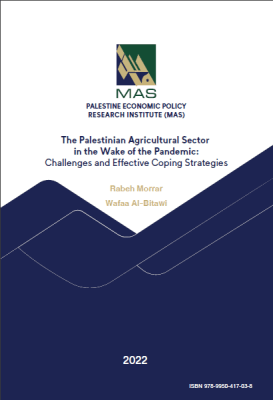The Palestinian Agricultural Sector in the Wake of the Pandemic: Challenges and Effective Coping Strategies
This study was undertaken within the remit of the main research program at MAS during 2021, to study the different effects of the Covid-19 pandemic on the Palestinian agricultural sector, both plant cultivation and animal breeding, along the entire supply chain. This study is part of a comprehensive research drive, initiated by MAS at the outbreak of the pandemic, to assess the pandemic’s repercussions on various macroeconomic, sectoral and social indicators, specifically in light of the research priorities identified by the Palestinian Ministry of Agriculture.
Therefore, the study assesses the impact of the pandemic on production inputs; farming methods; diversification in food production and marketing chains; consumer behavior and health awareness on the importance of consuming agricultural products. The study also analyzes the extent to which the pandemic contributed to strengthening the “return to the land” strategy, to enhance food security at the national level. This study aims to identify coping strategies that can protect the agricultural sector, considering the current pandemic, or any future shocks to which the agricultural sector may be exposed, in order to adapt to the long-term repercussions of the pandemic.
The study illustrates the negative impact of the pandemic on farmers’ ability to access production inputs and their ability to market their agricultural products, both internally and externally, as well as weak demand for agricultural food products and high levels of food insecurity.
The majority of agricultural producers in both the plant cultivation and animal breeding sectors believe that there is an urgent need to diversify sources of supply for production inputs, while establishing factories to provide raw materials for agriculture. They also stressed the need to develop a strategic system for securing production inputs, as well as adopting an agricultural calendar at the local level. Producers emphasized the importance of linking agricultural production with local, agricultural, food-processing factories.
Therefore, among its numerous recommendations, the study recommends the need to develop coping strategies for the agricultural sector in the face of the pandemic, or any future shocks to which this
sector may be exposed. In addition, government needs to adopt effective and direct interventions to reduce the repercussions of the pandemic on the sustainability of production inputs. This includes providing a fund to support/protect small-scale agricultural producers in securing their production inputs; activating the agricultural insurance system; developing lending programs or expanding the work of current lending institutions; and setting up mechanisms to compensate farmers by activating the work of existing government funds. Moreover, there is a need to clarify features of the strategy of economic disengagement from Israel, as well as practical steps that need to be taken regarding the agricultural sector.
MAS would like to thank Dr. Rabeh Morrar and Ms. Wafaa Al-Bitawi for their efforts in preparing this study, with the help of Ms. Dalia Abu Thaher, the study’s research assistant. MAS also thanks the Ministry of Agriculture and the agricultural sector expert Dr. Jamil Harb, who reviewed the first draft of the study and suggested numerous important improvements. Finally, MAS extends its gratitude to the Arab Fund for Economic and Social Development for financing this study, and for its continued support to MAS and Palestinian research priorities, helping to advance (and further develop) the Palestinian economy.

